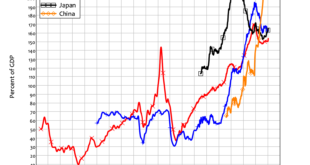As 2020 draws to a close, and with a new US President due to take office in a few weeks, we want to mark – if a little late in the year – the 80th anniversary of Karl Polanyi’s five lecture series at Bennington College, Vermont, which he called “The Present Age of Transformation”. PRIME is proud to have published these in pdf format back in February 2017, with the much appreciated consent of the college, which ‘houses’ the original lecture manuscripts. We were particularly delighted that...
Read More »Karl Polanyi’s “Present Age of Transformation”: the Bennington Lectures 80 years on
As 2020 draws to a close, and with a new US President due to take office in a few weeks, we want to mark – if a little late in the year – the 80th anniversary of Karl Polanyi’s five lecture series at Bennington College, Vermont, which he called “The Present Age of Transformation”. PRIME is proud to have published these in pdf format back in February 2017, with the much appreciated consent of the college, which ‘houses’ the original lecture manuscripts. We were particularly delighted that...
Read More »The GND and Europe’s next ten years: a plan for resolving the public debt crisis
The centrality of public debt to private capital markets In thinking about the next ten years, we must acknowledge that new times are coming, and they will lead to big changes in the capitalist system. The absolute novelty of the situation in which the COVID-19 crisis has placed the world, and even more markedly, Europe has made the financial and monetary options that have preoccupied economic debate so far, if not obsolete, at least questionable. It is a crisis that obliges us to rethink,...
Read More »The GND and Europe’s next ten years: a plan for resolving the public debt crisis
The centrality of public debt to private capital marketsIn thinking about the next ten years, we must acknowledge that new times are coming, and they will lead to big changes in the capitalist system. The absolute novelty of the situation in which the COVID-19 crisis has placed the world, and even more markedly, Europe has made the financial and monetary options that have preoccupied economic debate so far, if not obsolete, at least questionable. It is a crisis that obliges us to rethink,...
Read More »The GND and Europe’s next ten years: a plan for resolving the public debt crisis
The centrality of public debt to private capital marketsIn thinking about the next ten years, we must acknowledge that new times are coming, and they will lead to big changes in the capitalist system. The absolute novelty of the situation in which the COVID-19 crisis has placed the world, and even more markedly, Europe has made the financial and monetary options that have preoccupied economic debate so far, if not obsolete, at least questionable. It is a crisis that obliges us to rethink,...
Read More »How to strengthen European solidarity?
In 2020, the Covid-19 crisis generated a long-awaited paradigm shift in European economic governance. An unprecedented policy response was provided, together with an entirely new approach to fiscal capacity. The dogma of keeping the EU budget around 1 per cent of the Gross National Income (GNI) and keeping it in balance every year evaporated within a few months. As we look forward to building the Europe of of the next ten years, it is clear that it is not enough to create a new model...
Read More »How to strengthen European solidarity?
In 2020, the Covid-19 crisis generated a long-awaited paradigm shift in European economic governance. An unprecedented policy response was provided, together with an entirely new approach to fiscal capacity. The dogma of keeping the EU budget around 1 per cent of the Gross National Income (GNI) and keeping it in balance every year evaporated within a few months.As we look forward to building the Europe of of the next ten years, it is clear that it is not enough to create a new model budget,...
Read More »How to strengthen European solidarity?
In 2020, the Covid-19 crisis generated a long-awaited paradigm shift in European economic governance. An unprecedented policy response was provided, together with an entirely new approach to fiscal capacity. The dogma of keeping the EU budget around 1 per cent of the Gross National Income (GNI) and keeping it in balance every year evaporated within a few months.As we look forward to building the Europe of of the next ten years, it is clear that it is not enough to create a new model budget,...
Read More »To save the climate – don’t listen to mainstream economists
Ann Pettifor’s The Coming First World Debt Crisis (Pettifor 2006) was the first book to warn of the approaching 2007 Global Financial Crisis. More than decade after that crisis, its cause—excessive private debt, created primarily to finance asset bubbles rather than productive investment—is still with us, while we are entrapped in a pandemic crisis, and on the cusp of a climatic one. Figure 1: Private debt levels over the history of capitalism Looking forward to the next ten years, and given...
Read More »To save the climate – don’t listen to mainstream economists
Ann Pettifor’s The Coming First World Debt Crisis (Pettifor 2006) was the first book to warn of the approaching 2007 Global Financial Crisis. More than decade after that crisis, its cause—excessive private debt, created primarily to finance asset bubbles rather than productive investment—is still with us, while we are entrapped in a pandemic crisis, and on the cusp of a climatic one.Figure 1: Private debt levels over the history of capitalismLooking forward to the next ten years, and given so...
Read More » Heterodox
Heterodox


